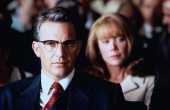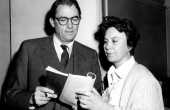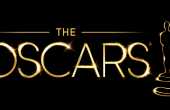John Wilson
John Wilson is a B.A. Honours student in the English and Professional Writing program at York University. When he is not pursuing his studies, you can find him at the movies.
Contributor I
- Plebian Penman
- Lurker
- Pssst
- Sharp-Eyed Citizen
- Actor
- ?
- Articles
4 - Featured
3 - Comments
16
- Ext. Comments
12 - Processed
13 - Revisions
8
- Topics
7 - Topics Taken
6 - Notes
9
- Topics Proc.
13 - Topics Rev.
1
- Points
657 - Rank
191 - Score
353
Latest Articles
Latest Topics
Hollywood on TrialDiscuss the political climate that existed in the American entertainment industry in the early 1950s that was exploited by Senator Joseph McCarthy and the House In-American Activities Committee (HUAC), and ramifications of the committee's investigations.
|
Claude Chabrol: Father of the Nouvelle VagueSometimes called the "French Hitchcock" — a term also applied to Henri-Georges Clouzot — Chabrol had a propensity for the thriller genre, though his style was undeniably more detached than that of Hitchcock. His debut was 1958's "Le Beau Serge," modelled loosely on Hitch's memorable "Shadow of a Doubt" (1943). Discuss Chabrol's career, his films and his legacy on the international filmmaking community. |
What's Wrong with This Picture?: The Films of Ed WoodThe Orson Welles of low budgets and poor taste would have turned 91 on October 10. This seems like an appropriate time to examine his films and their impact on other filmmakers — most notably Tim Burton, whose lovingly comedic 1994 biopic starring Johnny Depp brought films like "Plan 9 From Outer Space" and "Glen or Glenda?" back into the popular lexicon.
|
film Write this topicA Brief History of the Hollywood BlockblusterThis year marks the fortieth anniversary of "Jaws", which during the summer of 1975 kept North American audiences off the beaches and inside movie theatres. For good or ill, that film almost single-handedly revolutionized the way in which mainstream American films are produced and marketed. The anniversary provides an opportunity to explore in depth the artistic merits of the blockbuster film, as well as the ways in which "Jaws" changed the movie business.
|
film Write this topicThe Prevalence of Female Editors in the Film IndustryIt may be that the film industry is still dominated by men, but one of the few aspects of movie-making which has always been open to women is editing. This article could delve into why women became so prevalent in the editing room at a time when most women were not even in the workforce, relegated instead to subservient domesticated roles. This could also examine the influence female film editors have exerted through the decades — encompassing the work of Anne V. Coates (ranging from "Lawrence of Arabia" (1962) to this year's "Fifty Shades of Grey" and the films of Martin Scorsese's frequent collaborator Thelma Schoonmaker.
|
film Write this topicNow You Has JazzAn examination of the musical movement of jazz as it was depicted on film, ranging from "The Jazz Singer" (1927) to "High Society" (1956) and "Bird" (1988). This could also encompass what jazz music can add to otherwise non-musical films — the Duke Ellington score for "Anatomy of a Murder" might be the best example of this.
|
film Write this topicMASH versus M*A*S*HDiscuss the wildly divergent tones of the 1970 Robert Altman film and the popular TV series which followed. Analyze the culture that influenced both film and series, and explain why the two turned out so differently.
|
Latest Comments
| Male Protagonists in Hitchcock Films | |
Thoroughly well-written and most informative article. I have long held the belief that if a musical score in a movie is really good, then the audience won’t really remember it. But they will remember what it depicts. You hear the Bernard Hermann’s violent score for “Psycho” and you immediately picture Janet Leigh in a pool of blood in the shower. Ditto the ominous John Williams sound which suggests the approaching shark in “Jaws”. The images which are called to mind by that music are far more memorable than the music by itself. | The Importance of Scoring in Films |
I loved the “Hail, Caesar!” from beginning to end. Any film which manages to weave together lessons about morality and faith and still provide moments of high comedy is a winner in my books. The Coens’ films have always displayed their love of movies in one way or another, but in none of their previous films has it been quite as evident as it is here. It probably helps to have a good background in classic film before you go to see this film. When I saw it I was in a theater filled with mostly twenty- and thirty-somethings like myself, and I was the only person in the room who laughed at the reference to Norman Taurog and the mention of the ‘Wallace Beery Conference Room’. A lot of the references would just go over your head completely if you don’t know a lot about old movies, and that’s where most of the humor in the film came from. So in that sense I can understand why some people were disappointed in it. | Reviving Hail, Caesar! |
Great article. I have a great affinity for movie posters from the vintage of the ’30s through the ’60s. This was a period when movie posters had intrinsic artistic value. This was a time when the latter-day notion that movie posters are primarily marketing tools to get people in the theatre was still unheard of. | The History of Film Posters |
Another Otto Preminger film you may all be interested in checking out is “Bonjour Tristesse” (1958). It stars David Niven, Deborah Kerr and the oft-vilified and rather polarizing Preminger protégé Jean Seberg. I had to revisit it after reading this wonderful article on “Anatomy of a Murder.” “Bonjour Tristesse” — the English translation is “Hello Sadness” — was the first movie I saw in which the aspect ratio of a film informed my understanding of it. | Anatomy of A Murder: The Art of Observation |
A very sound analysis of one of the most popular theatrical musicals of the twentieth century. While I happen to disagree with your contention that “Fiddler” qualifies as a tragedy under Aristotle’s definition, I concede that your basic points are very well argued. | Is Fiddler on the Roof a Tragedy? An Aristotelian Analysis |
This is a fine article which convinces me absolutely that I will never be a good film critic. I’m just nod discerning enough. I can find something to love in even the worst cinematic experiences available. This makes me appreciate the attention to detail and keen sense of observation all film critics must employ. | The Glaring Importance of Critics in Filmmaking |
I don’t think Rita Hayworth gets enough credit for her musical abilities. Her singing in GILDA (’46) and YOU WERE NEVER LOVELIER (1942, with Fred Astaire) has an undeniably alluring and sexy quality which few of her peers could rival. | The Social Relevancy and Enigmatic Messages of "Gilda" |




I’ve never encountered anyone else who had seen “Young & Innocent” (“The Girl Was Young”). We may be soul mates!
How lucky you are to have received a response from Ms. Miles, by the way. That must have been quite a kick.